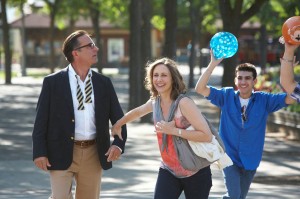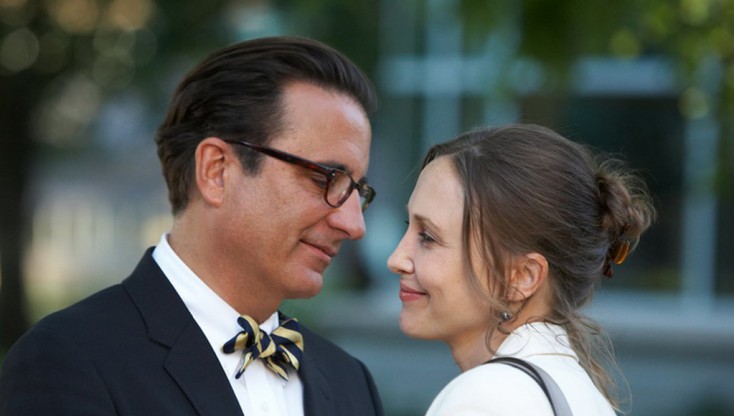
(l-r) George (Andy Garcia) and Edith (Vera Farmiga) explore the college campus of Middleton in AT MIDDLETON. ©Anchor Bay.
By PETERSON GONZAGA
Front Row Features Wire
HOLLYWOOD—It’s been quite a while since Vera Farmiga has made a romantic comedy. Having been busy with action and horror/suspense films along with her current role as spooky hotelier Norma Bates in the A&E television series, “Bates Motel,” Farmiga was elated to find the time to star opposite Andy Garcia in “At Middleton.”
The Academy Award-nominated actress (who played George Clooney’s love interest in “Up in the Air”) is Edith, a helicopter mom, who is touring a college with her daughter, Audrey (played by her real life sister Taissa Farmiga). By chance, Edith meets tightly wound George (Andy Garcia), a surgeon who also is visiting the college with his son, Conrad (Spencer Lofranco). A romantic spark happens between the two very different adults when they stray from the tour group and take their own journey of discovery around the Middleton campus.
As the luminous-looking actress arrives at a hotel suite to discuss the movie, she appears ready to delve into the excitement and passion of making the film involving two mature adults, and working with director Adam Rodgers, who co-wrote the film with Glenn German. With Valentine’s Day around the corner, she also talked about romance and parenting two young children at 40. She is married to musician Renn Hawkey.
Q: Having directed your first film a few years ago (2011’s “Higher Ground”), how do you think first-time director Adam Rodgers did on this?
Farmiga: He’s top notch. (Making this film) has been one of my favorite experiences, and I’m not just trying to be positive for the press junket’s sake. This is just a good bunch of people. They’re just clothed in grace, elegance, gentleness and good sportsmanship. There’s very little ego to all these collaborators that came together. It’s easy going and easy to be with them. It’s easy to call them your friends. That’s a lot of it. They’re brilliant writers. I’d like to take credit for any certain measure of chemistry that you see, but I can’t because it was all on the written page.
Q: This film is more a romantic dramedy than a traditional rom-com, delving into mature issues like mid-life crisis and so forth. Do you relate to some of the concerns your characters raise?
Farmiga: I’m having my own parenting and identity crisis being the mom of a 3-year-old and 5-year-old, where the most important role for me is of mother and wife at the moment. My career, since giving birth, is second. It’s actually quite hard to be 100 percent present or prepared like I used to be. I kind of wing it but I wing it to the best of my ability. One informs the other. I think I’m a better mom because I have this wonderful outlet. I’m a better artist because I have the great love and knowledge of what it means to love children. I grew up watching Meg Ryan (romantic comedies) in the 80’s. Those were love stories about adults investigating what it means to love and live and redefining themselves as they aged. I can’t remember the last time (I saw a romance between two adults in a mainstream film) before the Ethan Hawke and Julie Delpy (“Before Sunset”) films. I rent films from the 70’s.
Q: What does romance mean to you?
Farmiga: Romance means being passionate and inspired, and being present. To have that awareness is to not take it for granted. What I’ve discovered about it is you can’t just wait for it to happen; you have to chase after it with a club. You have to revitalize that for yourself on a daily basis. It means commitment to the idea of romance. It’s a choice to have a romantic life. In that way, love becomes a decision. That’s what was so vital to me about this movie. From the outside, it’s a very lighthearted romantic comedy, but at the heart of it are these heavy-duty concepts like “Is love a decision? Is it something that you choose to do if it falls into your lap and you deny it? Is love an errand? Do you choose who you love?”
Q: Did playing the mother of a college-age child get you thinking ahead about your kids when they reach that age?
Farmiga: My kid just turned five a few days ago and he’s going to kindergarten next year so I’ve already experienced letting him loose to pre-school. I’ve already experienced letting him go. He’s such a sociable guy. He’s the guy you want to meet the first day of pre-school. He says, “Hi, my name is Fynn Hawkey. Do you want to play with me?” He doesn’t even look back to say goodbye. I see him going off and I wonder if I’ve girded him with the wisdom to spend the day away from me. In my own incremental, I get how that feels. I certainly get why my mom cried when she left me at university. It’s so hard, that Empty Nest Syndrome. It’s a transitional phase and an emblematic, symbolic kind of end of childhood. You wonder if you have adequately prepared the child to have what it takes to live a successful life and if you’re adequately equipped to persevere on your own now that the nest is empty.
Q: Have you prepared with your daughter?
Farmiga: I did with my sister. There’s a 21 years age difference between us. She’s my baby sister. There are seven kids in our family, and she’s the youngest. Andy suggested she play the role (of my daughter) because he saw me direct her (in the 2011 film “Higher Ground”). She never wanted to do it. She had no anticipation of becoming an actress. I forced her to do it. Then she got a lot of attention and her career sort of came as a result of her performance in that film and the risk she took. But I like to think that I modeled for her what it means to take risks in the 15 years before I put her in my movie. Yeah, she’s my baby sister, but she’s also one of my best friends. She has been a surrogate daughter to me and I think I’ve been maternal to her in a surrogate way. So, what you’re seeing (in the movie) is relevant to who we are in real life.
Q: You and Andy have a fun duet on the piano. Can you really play?
Farmiga: I did play and I studied that piece really hard. Meanwhile, Andy riffed, because he’s more of a jazz musician so he can sit and play. I had to study it so I learned my part but I did grow up playing piano and competing and doing competitions as a kid. I was so happy to finally put it on screen and do something special.
Q: Would you want to revisit these characters someday?
Farmiga: Is it too late to pull the plug and do a television series (She laughs.) Honestly, we’re starved for adult romances that are fortified with the vitamins and minerals of spiritual reflection and life. It’s like it’s a vintage concept. There’s sort of a dearth of stories about adults falling in love.
Q: When’s the last time you were on a college campus?
Farmiga: It was 1990, Elizabethtown College (in Pennsylvania), when I was thinking about becoming a music therapist.
Q: How did your parents handle you leaving for college?
Farmiga: There was a lot of stress, excitement and anxiety—all these weird emotions that would come out in stressful ways between my mom and I. I’m also one of the first people in my family to go to college, so I didn’t know what to anticipate. My mom couldn’t advise me. My mom graduated from community college in New Jersey. It marks these huge transitional phases in a child’s life and in a parent’s life. There are lots of strange emotions colliding and complicating things. I remember it wasn’t a breeze
Q: Will we see you directing again?
Farmiga: Eventually, yeah. At the moment, I love being directed and my commitment is as an actress and a mom and a wife. I love directing. I’m not that interested in directing myself. But I’ll find that story and when it’s right, I’ll do it.
Q: What can you say about the next season of “Bates Motel?”
Farmiga: It’s coming out in March. All these characters get more fully immersed in the community that they’ve settled in. The season starts off with a certain successful business. The season starts off with Norma (her character in the show, a prequel to “Psycho”) enjoying a certain measure of success. She’s gotten everything that she wanted to achieve with this motel. It’s a bang up business at the start of the season but it all goes terribly awry when a certain guest shows up.
Q: How freeing is it doing a role like Edith in comparison to Norma Bates in “Bates Motel?”
Farmiga: It’s invigorating. There are many childlike aspects to Norma as well. I cherish those because it is a dark show and there are some really strong, torturous emotions that we convey and she is a more tortured soul than Edith, but there are some childlike qualities that Norma has. She’s almost stuck in her childhood. She’s had such a twisted childhood that she will be sort of forever stuck in this place. She’s almost playing at being a grown up. With Edith, I was inspired by Lucille Ball and Carol Burnett. It was a chance for me to just let it rip. It’s physical comedy too, and that makes it really different from Norma.




